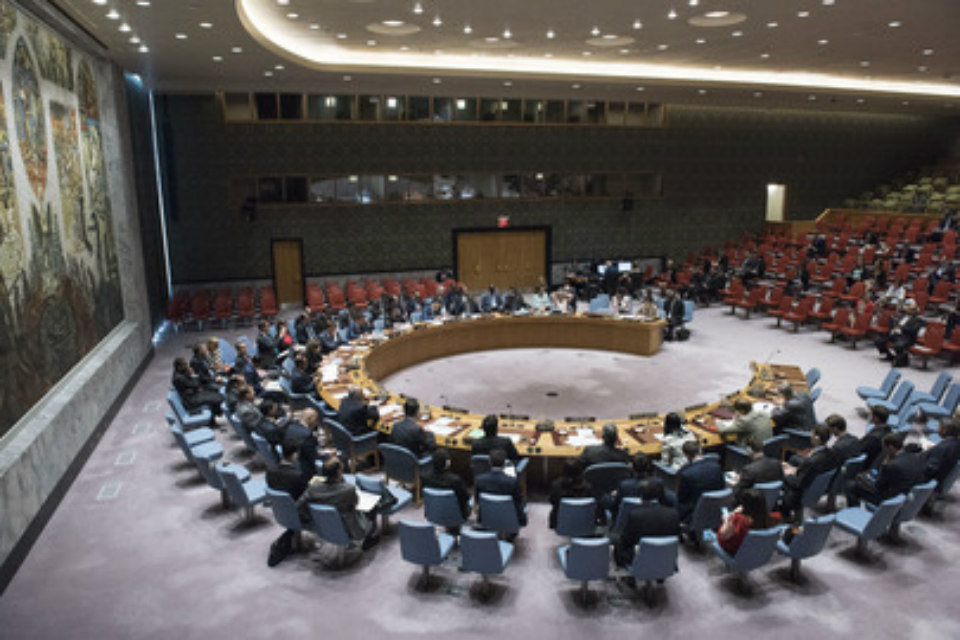"As a long standing friend of the Burmese people, the United Kingdom has watched in horror at the violence that has erupted over the past month."
Statement on Burma by Ambassador Jonathan Allen, UK Deputy Permanent Representative to the United Nations, at the Security Council briefing.

Thank you Mr President and thank you Mr Secretary-General for your briefing, and for all that you have done to bring this issue before the Council.
As a long standing friend of the Burmese people, the United Kingdom has watched in horror at the violence that has erupted over the past month. What began as a series of attacks by the Arakan Rohingya Salvation Army has spiralled into an acute humanitarian crisis – one which now poses a threat to stability and security in the region.
We have all heard the reports, Mr President. We have all heard of the extrajudicial killings, the burning of villages. We’ve heard of the cruelty; the sexual violence, the landmines laid along routes taken by refugees. Half a million people have fled, many bearing the scars of the violence.
The vast majority are Rohingya Muslims, although they also include Buddhists, Hindus, and other minorities. But make no mistake, this is a human tragedy and an acute humanitarian crisis that has exploded at an almost unprecedented speed.
At the outset, I want to pay tribute to the government and people of Bangladesh for providing safety and shelter to so many until they can return safely, voluntarily, and sustainably to their homes in Burma. I also want to acknowledge the important diplomatic efforts undertaken by Indonesia, ASEAN, the OIC, and the United Nations. It is becoming increasingly clear, Mr President, that world opinion, whether among countries or international organisations, is aligning on this issue.
In the face of such opinion, it falls to Burma – and in particular the Burmese military – to respond. For it is the Burmese military who bear the primary responsibility for resolving this crisis. There is a way out.
First, the Burmese military, under Commander in Chief Min Aung Hlaing, must immediately stop the violence in Rakhine State and ensure the protection of all civilians, including the Rohingya. In this chamber I repeat my government’s condemnation of the attacks carried out by the ARSA last month. But military operations in response have been excessive and vigilante groups have carried out sectarian violence unchecked. This cannot continue. The hate speech and incitement to violence must stop. The Burmese military must act immediately and uphold the rule of law and we are particularly concerned to ensure that the violence doesn’t spread to central Rakhine.
Second, the Burmese authorities need to grant UN agencies and their partners full and unhindered humanitarian access to Rakhine. We welcome the government’s cooperation with humanitarian agencies such as the International Committee of the Red Cross and we welcome the Red Cross’s efforts to respond to the crisis. But the humanitarian needs inside Rakhine vastly exceed the Red Cross’s capacity. Only UN agencies and their partners can provide urgent, life-saving assistance at the scale required. We believe the authorities should calm anti-United Nations rhetoric and stop it immediately in state media outlets.
Third, Burma should work with Bangladesh to establish a safe, voluntary, and sustainable way for those who have fled Rakhine to return to their homes. We welcome the civilian government’s commitment to the right of return. But previous arrangements have been inadequate. There needs to be a process which allows those who have fled to register themselves as refugees. It needs to be a process which acknowledges that many fled without documents or never had them in the first place, a process which allows people to return to their homes and places of origin safely, voluntarily, and sustainably. And we welcome the UN’s willingness to support this.
Fourth, the recommendations of the Annan Commission on Rakhine State must be implemented swiftly and in full. We welcome the Burmese authorities’ public commitment to this and the establishment of a Ministerial Implementation Committee. It is essential that we now see progress, particularly on citizenship.
Fifth, we urge the Burmese authorities to cooperate with the UN Fact-Finding Mission established by the Human Rights Council. If the Burmese authorities have any doubt about what is happening, this is how reports can be independently verified and those responsible held to account.
Mr President, this Council deliberates many crises around the world. But the situation in Burma strikes many of us around this table with particular poignancy. Many of us here today have stood by the people of Burma for long years, have watched the inspiring steps taken towards democracy, and have welcomed the country back into the international community with open arms.
Given our history and long-standing friendship with Daw Aung San Suu Kyi, the UK is perhaps foremost. And we remain committed to Burma and to all of its people. We want to see further progress towards democracy. And we want Burma to thrive within the international community. And it is because of that commitment, Mr President, that we speak so frankly today in this Chamber. This crisis now casts a deep shadow over Burma’s international reputation, on its leaders and its military.
The Burmese authorities must now take the decisions that will decide their place in history. They can choose to end the violence and protect civilians and defend human rights. They can choose to allow humanitarian access including by the United Nations. They can work with Bangladesh on the return of refugees and they can address the long-term issues raised by the Annan commission.
But should they fail to do so, they will find themselves on the wrong side of history. And this Council must be ready to take further action.
Thank you, Mr President.